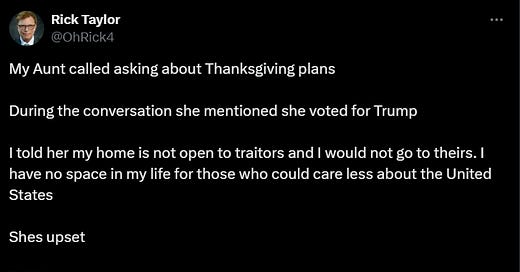Justine Bateman, Canceling Family Members, and Our Urge to Cast Out Political Heretics
Reminder: intolerance is not a virtue.
The great author Graham Greene once said, “Heresy is another word for freedom of thought.”
I thought of Greene’s words last week while writing my column for the Washington Examiner, which explores the growing trend of casting out political heretics (i.e. telling your aunt she’s not welcome for Thanksgiving Dinner because she voted for the wrong candidate).
How did we get here? (And let me make it clear: if you’re a Trump supporter and doing this to your aunt who voted for Harris, it’s just as bad.)
At the Examiner, I explore the ideology that turned intolerance into a virtue. (READ IT HERE)
I also talked to Bob Harden about the problem on his morning show.
Apparently I’m not the only person fed up with the unhealthy trend of banishing people over opinions and politics.
As many may already know, Justine Bateman (whom many of us remember from Family Ties) recently unleashed a tweetstorm to her 140k followers, in which she said she’s sick and tired of “walking on eggshells for the past four years.”
Here is a sample of what she wrote:
“Common sense was discarded, intellectual discussion was demonized. . . Complete intolerance became almost a religion and one’s professional and social life was threatened almost constantly. Those that spoke otherwise were ruined as a warning to others. Their destruction was displayed in the ‘town square’ of social media for all to see.”
Bateman did an interview with The Free Press to elaborate on her thoughts, which had touched on “a spiritual heaviness that has been on our society for the past 4 years or more.”
Peter Savodnik, who interviewed Bateman, mentioned a theme I recently wrote about: Generation X finally flexing some cultural muscle.
“Bateman is a member of Generation X, as am I, so I was hardly surprised to see a Gen Xer—those of us who mostly grew up in the 1970s and early 1980s—willing to say what so many Americans (of all ages) had been thinking,” writes Savodnik.
If you have no idea what I’m talking about, I’ll leave you with Bateman’s Gen X-style response to those who’ve told her she’s treading into dangerous waters by speaking her mind.
“For those of you who have reached out to tell me to ‘beware of the group with whom you are associating,’ I say, ‘F*ck off.’ If you don’t like it,” she concluded, “move the f*ck on.’ ” (And if you’re wondering, yes — I put those asterixis in there.)
[Bonus content: The video below talks about a phenomenon I recently wrote about and will be publishing on in the near future: ostraca, the ancient Greek practice of banning people deemed “a threat to democracy.”]





I was born in 1967… Gen X speaks their mind. No filter! Gen X forever.
I liked your comment in the audio about how our politics doesn't make us good people.
Our immediate family is mostly aligned politically so no anticipated problems over the holidays. But I think it is a terrible shame for friends or family members to cut ties from one another due to politics. We need to strengthen bonds, not break them. In times of crisis (real crisis - not manufactured crisis) we must stick together. We must love one another, no matter who you've voted for. It's what God has urged us to do. It's the only way to live life in peace, without rancor. Resentment eats away at both parties.